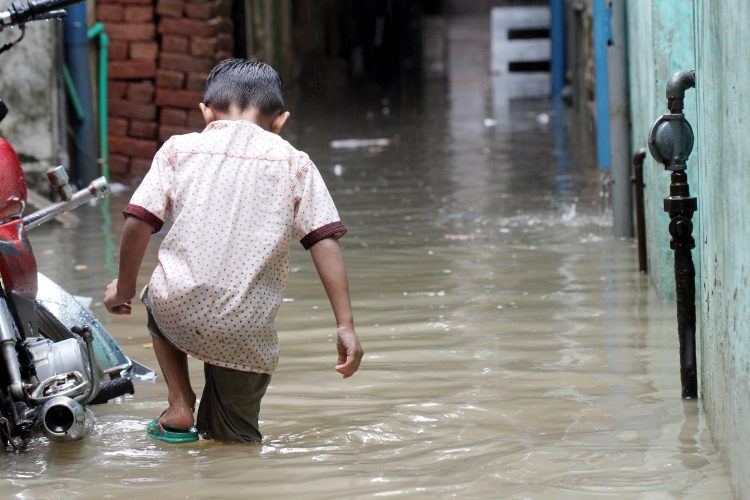Are rice shortages on the horizon?
- Like
- Digg
- Del
- Tumblr
- VKontakte
- Buffer
- Love This
- Odnoklassniki
- Meneame
- Blogger
- Amazon
- Yahoo Mail
- Gmail
- AOL
- Newsvine
- HackerNews
- Evernote
- MySpace
- Mail.ru
- Viadeo
- Line
- Comments
- Yummly
- SMS
- Viber
- Telegram
- Subscribe
- Skype
- Facebook Messenger
- Kakao
- LiveJournal
- Yammer
- Edgar
- Fintel
- Mix
- Instapaper
- Copy Link
Posted: 27 July 2023 | Professor Chris Elliott | No comments yet
Will we be facing shortages of rice in the near future? Professor Chris Elliott examines the impact of the Indian rice export ban and reveals some shocking findings…


Devastating floods in Pakistan were said to be partly responsible for previous rice shortages
On a very wet Saturday afternoon last week I was driving through Belfast with me son. My phone rang, I answered it (hands free of course) and took a call from Sky News. They wanted to do an interview with me later that day on the ‘Indian rice story’ and the fact that information was released by the Indian government banning some exports of rice from their country. I agreed, and turned to my son and said: “you and everyone else is going to hear a lot more about food insecurity in the mainstream media. It’s going to impact the whole world no matter where we live”.
I have been following developments in the Indian rice sector for some time. For weeks there were rumours that the Indian Government was going to take some important steps to try and curb food inflation in the country. Shortages of some staples in the country, namely tomatoes, onions and rice, were fuelling hyperinflation in the food sector. While issues in Ukraine were having some knock on effects, the biggest cause of the problems have been caused by climate change. Harvests ruined by excessive rain and flooding in many parts of the country have been reported for several months.
It would seem the Government in India is less worried about food shortages in the country than the price rises. Doubtless some in the country will go even more hungry than in other years, but the main issue seems to be political. With elections in India looming, rampant food inflation isn’t good for the hopes of the current ruling administration.
India is the world’s largest exporter of rice, with the ban applying to non-basmati varieties which accounts for around 25 percent of rice exports. Such a ban will have devastating effects on some regions of the world and in particular sub-Saharan Africa, which imports most of its rice from India. These countries will struggle to compete on the international markets for any available rice as the prices will increase markedly. Only adding to the problems is flooding in China, which has further damaged rice harvests. I have recently been told China is scouring the world for rice current and is ‘hovering everything up in sight’.
So what will be the consequences of this for the UK? While most of the rice we import from India is Basmati, we also import a lot of non-Basmati for a wide variety of purposes. I don’t expect to see any major shortages in supply as the UK is a relatively affluent country (despite its recent economic challenges). Some sharp increases in prices are almost certain. In fact, I have been picking up for some time issues with rice supply in the UK. This was put down to the massive flooding in Pakistan last year which devasted their rice harvest. I was also alerted to the fact that some of the quality of rice being imported was much lower than normal, at least by a number of companies.
After some checking we found evidence of this in two areas. First of all the amount of ‘broken rice’ in some products was much higher than normal. Broken rice is produced by issues during processing and sells for a fraction of the price of whole rice. Normally we should expect very little broken rice in what we buy, but our data suggested up to 10 percent in some cases was present. What was more worrying was the pesticide levels we found in rice on sale in the UK. Pesticide levels were above the regulatory limits and in some cases pesticides were found that are not legal to be used or be present in foods sold in the UK.
Our findings were reported to the Food Standards Agency (FSA) and the UK Rice Association as well as the companies where we found issues. Based on the latest testing evidence that I am aware of, these problems have not gone away and in fact are getting worse. With the latest announcement from the Indian Government, I worry greatly about what will be imported into the UK over the coming months. Clearly the FSA, the rice industry and the wider food industry must step up their vigilance to stop any shady practices continuing which will undermine consumer confidence.
If we think food inflation is a thing of the past and soon things will return to normal, then we must think again. The looming spectre of climate change will mean we will continue face ongoing issues with supply, price and safety of many imported foods. It is surely time that our government opens its eyes to the massive food security issues we will face into and start to take some very long overdue action.
If you found this article informative and engaging, then we have a special invitation for you. Join us at our upcoming event Food Integrity Global, where we dive deeper into the topics discussed here, providing a platform for stimulating conversations and networking opportunities. Experience first-hand the excitement of being part of a dynamic food & bev community passionate about shaping the future of food integrity, safety, and sustainability.
Mark your calendar and be prepared to be inspired. We look forward to welcoming you to an unforgettable event that will leave you with valuable insights and a renewed enthusiasm for the subjects that matter most to you.
Food Integrity Global
17-18 October 2023
Topics covered include: Food safety, Diversity, Food fraud, Sustainability, Microbiology and Labelling









